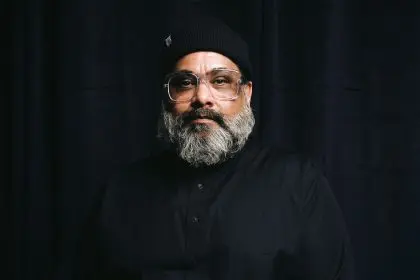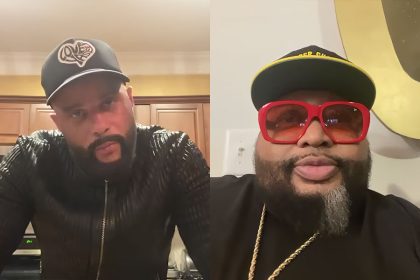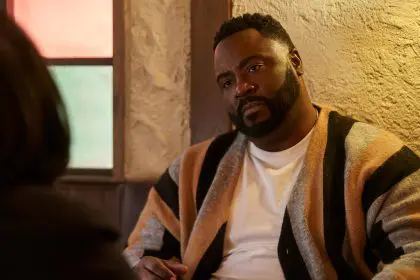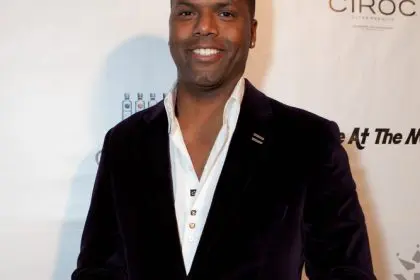Step into the world of Eriq La Salle, where artistic excellence meets cultural impact. From his breakout role in “Coming to America” to commanding the screen as Dr. Peter Benton on ER, La Salle has masterfully navigated Hollywood as an actor, director and storyteller. His latest venture sees him both directing and starring in Amazon’s “On Call,” Wolf Entertainment’s first scripted streaming series. The high-octane drama, which premiered January 9 with all eight episodes, features La Salle as Sgt. Lasman alongside Troian Bellisario’s veteran officer Harmon.
Shot in Long Beach, California, the series incorporates body cam, car dash and cell footage to create an immersive police drama, inspired by real police calls and ride-alongs. Born in Hartford, Connecticut, he transformed his Juilliard and NYU Tisch School of the Arts education into a career that spans Broadway, blockbuster films and groundbreaking television. Now, as he balances directing for Dick Wolf productions while crafting his own thriller novel series, La Salle continues to break barriers and create pathways for the next generation of Black creators.
What was it like being selected on the spot for Coming to America, creating such a cultural moment?
As an artist, with all the politics and the way things are usually run – what it takes to get a job, do your audition, and you wait and pester your agent with “Did I get it? Did I get it?” – it becomes part of your routine. This was early in my career, but it becomes something you get used to, dreading Fridays because if you don’t hear by then, you have to wait the entire weekend. Having John Landis, who was at the height of his career, hire me in the room was extraordinary.
At that point, you don’t know it’s going to become this iconic film Coming to America. But as a working, hungry actor, A, you just want a good job, and B, you don’t want to go through all the craziness you’re used to going through, all the waiting and torture. So having this powerful, successful director hire you in the room and clarify that right there – it means you get to carry the joy of the audition right into securing the role, as opposed to those normally being very separate. It just made it even more magical.
Why is understanding the journey from stage to film to directing so important for actors?
I was blessed at 15 years old with an amazing mentor, Clay Stevenson. He’s no longer with us, but he set such a high bar and standard. He never treated me like I was a kid who couldn’t understand things. He held me accountable – there was accountability to my actions as a young boy becoming a man, accountability to my actions as an artist pursuing a career that, at that time, we were not well represented. This was a new thing, so you had to be even more accountable – accountable in how you approach the work, accountable for your homework, your studying.
No one’s going to—so he held me accountable and he instilled that old-fashioned trade. My mother did it from the way that a mother does with a son and their approach to life. But I think hearing this from a Black man that I looked up to and respected really registered. That laid the foundation for how I decided to approach this industry – to get the best training I could and to work as hard as I could.
As a powerful Black male lead, what cultural nuances do you see between playing a doctor and now directing and portraying a police sergeant?
Everything comes from a sense of pride – and when I say pride, I don’t mean egotistical pride. I mean having respect for things, having respect for the craft. I came from an all-Black environment, an all-Black high school – a 99.99% Black high school. I think we had like one or two white people in my school. So I came from a very particular perspective. But if you want to represent art, if you want to represent creativity, you have to expand that perspective.
We as African Americans are more likely in our ascension toward success to become exposed to white culture than our white counterparts ascending. You have so many CEOs, so many powerful people that can say they’ve never been in an all-Black environment. But there are very few successful African Americans or people of color, women, who can say that they’re hugely successful but haven’t been in those rooms where they were the minority. Understanding that affects my work, affects the kind of roles I play.
I don’t want to do anything degrading. I like doing interesting characters. I’ve been fortunate to play a doctor, to play Logan – this was just a hard-working, simple Black man that was a farmer. I took pride in playing that character as I did playing a doctor, as I do playing a sergeant in a police force. There’s this misconception when I hear actors giving interviews, they always make it seem like, “Well, I did this, I picked this.” Listen, the bottom line is this: we’re hungry to work. Very few of us really sit there and go, “Okay, I have this choice, this choice, this choice.” Most of us, particularly as you’re climbing, are like, “It’s a good role. It’s not embarrassing. Okay, I’m on it.” Now, within that, let me bring as much integrity to it, let me try to elevate it into something even more.
What’s it like being able to pull others up with you and share accountability with love, having been the only one in the room?
At this point, it’s one of the most rewarding feelings. Even now, I’m in New York directing a show, and I saw an African American PA on the set who wasn’t listening on something. I pulled him aside, just kind of whispered in his ear lovingly – I didn’t have people doing that for me because they weren’t around. Because a lot of times I was the only one on set. But letting him know that, dude, you have to be excellent. You have to strive to be excellent.
Because you and I are more from the generation – our parents instilled in us, my mother, my single Black mother, taught me at an early age: You have to run faster, jump higher just to be considered equal. There was that mentality, and so I think this generation, they kind of feel they can float. They can’t float that way. The reason I became a director is because I knew even on ER that I would not be valued in this industry the way white counterparts would. That’s the system, so I’m here to change the system. Now I’m in the room where decisions are being made, and I have a voice in that room. I can shape a show, shape the reality of a show, the perception of characters, and suggest diverse casting choices. Often it’s not met with resistance – they just didn’t think about it.
Why is it important for actors to understand they’re going to start someplace, show up their best, and not worry about the rest?
You don’t control the results of showing up – you only control showing up. Listen, I’ve lost jobs that the director has told me, “You were the best choice, but because of this reason, we have to go somewhere else.” I’ve also gotten jobs that I probably didn’t deserve, that someone else might have been better than me for, but again, politics or whatever.
So it goes both ways. What you do control is that every time I show up, I’m going to show up as prepared as possible. I’m going to show up smarter than last time – I learned this, learned that. I’m going to show up giving my all. That’s what you control. And if you do that long enough, and you study hard enough, and you work hard enough, it pays off at some point.
You’re working with Dick Wolf while developing your own franchise. What’s next?
I learned from Dick – I learned so much. He’s a master. And I call him Uncle Dick because he’s been so good to me, and this man has propelled me forward. He believed in me, and I love him, and I respect him. For the last 12 years, I’ve been writing this franchise of books – the Marder Maker series: “Laws of Depravity,” “Laws of Wrath,” “Laws of Annihilation,” and then the new one coming out is “Laws of Solomon.” I’m coming out with two more, and I’m starting a new franchise after I finish this franchise.
The reason I come back to the books is because it is important for us as people of color to have ownership. It’s one thing to be learning everything I can in the Dick Wolf camp – I will never be Dick Wolf, and I’m honored to be offered a seat at his table. But I think it’s also very important, simultaneous to that, that we are creating our own tables and we also get to determine who sits at that table. So you learn from the masters, and he is the master. The power of franchise, what it means to us and how we get to call shots, I think, is important. Everything about ownership and creating opportunities – my books were designed to answer that question. That’s where I am.

















